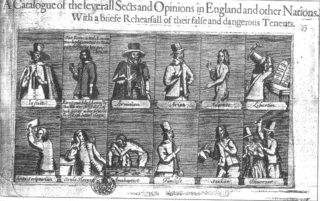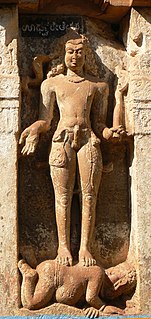
Anabaptism is a Christian movement which traces its origins to the Radical Reformation. The movement is generally seen as an offshoot of Protestantism, although this view has been challenged by some Anabaptists.

Baptists are Christians distinguished by baptizing professing believers only, and doing so by complete immersion. Baptist churches also generally subscribe to the tenets of soul competency/liberty, salvation through faith alone, scripture alone as the rule of faith and practice, and the autonomy of the local congregation. Baptists generally recognize two ordinances: baptism and the Lord's supper.

Menno Simons was a former Catholic priest from the Friesland region of the Low Countries who became an influential Anabaptist religious leader. Simons was a contemporary of the Protestant Reformers and it is from his name that his followers became known as Mennonites.

Plain people are Christian groups characterized by separation from the world and by simple living, including plain dressing. Many Plain people have an Anabaptist background. These denominations are of German, Swiss German or Dutch ancestry. Conservative Friends are traditional Quakers who are also considered plain people; they come from a variety of different ethnic backgrounds.

JakobHutter, was a Tyrolean Anabaptist leader and founder of the Hutterites.

The Münster rebellion was an attempt by radical Anabaptists to establish a communal sectarian government in the German city of Münster.

Abecedarians were a 16th-century German sect of Anabaptists who rejected all human learning. Questions have been raised as to the historical accuracy of the name and sect.

English Dissenters or English Separatists were Protestant Christians who separated from the Church of England in the 16th, 17th and 18th centuries.

The Familia Caritatis, also known as the Familists, was a mystic religious sect founded in the sixteenth century by Henry Nicholis, also known as Niclaes. Familia Caritatis translates from Latin into "Family of Love", and in other languages, "Hus der Lieften", "Huis der Liefde" and "Haus der Liebe".

The Radical Reformation was the response to what was believed to be the corruption in both the Roman Catholic Church and the expanding Magisterial Protestant movement led by Martin Luther and many others. Beginning in Germany and Switzerland in the 16th century, the Radical Reformation gave birth to many radical Protestant groups throughout Europe. The term covers both radical reformers like Thomas Müntzer, Andreas Karlstadt, groups like the Zwickau prophets and Anabaptist groups like the Hutterites and Mennonites.
Ambrosian chant is the liturgical plainchant repertory of the Ambrosian rite of the Roman Catholic Church, related to but distinct from Gregorian chant. It is primarily associated with the Archdiocese of Milan, and named after St. Ambrose much as Gregorian chant is named after Gregory the Great. It is the only surviving plainchant tradition besides the Gregorian to maintain the official sanction of the Roman Catholic Church.

Lakulisha was a prominent Shaivite revivalist, reformist and preceptor of the doctrine of the Pashupatas, one of the oldest sects of Shaivism.
A schism is a division between people, usually belonging to an organization, movement, or religious denomination. The word is most frequently applied to a split in what had previously been a single religious body, such as the East–West Schism or the Great Western Schism. It is also used of a split within a non-religious organization or movement or, more broadly, of a separation between two or more people, be it brothers, friends, lovers, etc.

Adrian Hamsted was the eponymous Dutch founder of the sect of Adrianists.

Simplician was Bishop of Milan from 397 to 400 or 401 AD. He is honoured as a Saint in the Roman Catholic and Eastern Orthodox Churches and his feast day is August 14.
In Christian heresiology, there have been historical claims that certain Christian sects worshipped the devil. This was especially an issue in the reaction of the early Church to Gnosticism and its dualism, where the creator deity is understood as a demiurge subordinate to the actual, transcendent God.
Hendrik Nicholis (c.1501–c.1580) was a German mystic and founder of the Christian sect "Familia Caritatis".

Nonconformity to the world, also called separation from the world, is a Christian doctrine based on Romans 12:2, 2. Corinthians 6:17 and other verses of the New Testament that became important among different Protestant groups, especially among Anabaptist. The corresponding German word used by Anabaptists is Absonderung. Nonconformity is primarily expressed through the practices of plain dress and simple living.












